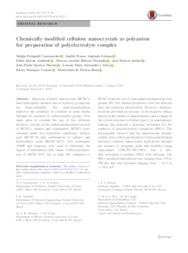Chemically modified cellulose nanocrystals as polyanion for preparation of polyelectrolyte complex.
Chemically modified cellulose nanocrystals as polyanion for preparation of polyelectrolyte complex.
Author(s): VASCONCELOS, N. F.; FEITOSA, J. P. A.; ANDRADE, F. K.; MIRANDA, M. A. R.; SASAKI, J. M.; MORAIS, J. P. S.; SILVA, L. M. A. e; CANUTO, K. M.; ROSA, M. de F.
Summary: Bacterial cellulose nanocrystals (BCNCs) have hydrophilic surfaces due to hydroxyl groups but are water-insoluble. The carboxymethylation improves the solubility of cellulose in polar media through the insertion of carboxymethyl groups. This study aims to evaluate the use of two different alcoholic solvents in the carboxymethylation reaction of BCNCs: ethanol and isopropanol. BCNCs were obtained under two hydrolysis conditions: sulfuric acid (BCNC-S) and combination of sulfuric and hydrochloric acids (BCNC-S/Cl). Two techniques (NMR and titration) were used to determine the degree of substitution (DS) values. Carboxymethylation of BCNC-S/Cl led to high DS compared to BCNC-S and the use of isopropanol promoted an even greater DS. The thermal properties were not affected after the chemical modification. However, functionalization provided an increase in the negative charge density at the surface of nanostructures and a change in the crystal structure (cellulose type Ia for amorphous), making this material a potential polyanion for the synthesis of polyelectrolyte complexes (PECs). The micrographs showed that the nanocrystals became soluble after carboxymethylation. Carboxymethylated bacterial cellulose nanocrystals hydrolyzed through the mixture of inorganic acids and modified using isopropanol (CBCNC-S/Cl-IPA) was a suitable polyanion to produce PECs with chitosan. The PECs produced had particle size ranging from 276 to 588 nm and zeta potential ranging from - 24.3 to + 39.0 mV.
Publication year: 2019
Types of publication: Journal article
Unit: Embrapa Cotton
Observation
Some of Embrapa's publications are published as ePub files. To read them, use or download one of the following free software options to your computer or mobile device. Android: Google Play Books; IOS: iBooks; Windows and Linux: Calibre.
Access other publications
Access the Agricultural Research Database (BDPA) to consult Embrapa's full library collection and records.
Visit Embrapa Bookstore to purchase books and other publications sold by Embrapa.

